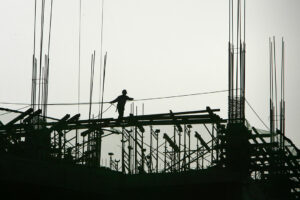
Marcos says gov’t infra projects to cause traffic woes
PRESIDENT Ferdinand R. Marcos, Jr. on Sunday appealed for the public’s patience as his government pursues infrastructure projects that could worsen traffic congestion in the capital region.
In a five-minute video, he said developing nearby provinces and cities is one of the long-term solutions to Metro Manila’s traffic woes.
But development projects outside Metro Manila could take time and worsen traffic congestion in the near term, he added.
“These are big projects, so it’s unrealistic to expect the gains tomorrow,” he said in Filipino. “Sometimes, it could even worsen traffic.”
“So be patient because once everything is completed, rest assured that our situation will improve,” he added.
National Economic and Development Authority (NEDA) Secretary Arsenio M. Balisacan told a palace briefing last week the President wants a comprehensive and holistic approach to the capital’s traffic problem, not a “piecemeal approach.”
“In the planning of our transport system, we should be looking at the intermodal transport system and see how they operate efficiently as a whole,” he added.
The Management Association of the Philippines last month called for a state of calamity declaration in Metro Manila to address road congestion through the President’s special powers.
The private sector group had also urged the President to appoint a traffic czar.
Traffic congestion in Metro Manila is costing the Philippine economy at least P3.5 billion daily or P1.27 trillion annually, according to a Japan International Cooperation Agency study.
MAP Transportation and Infrastructure Committee Chairman Eduardo H. Yap said at a Mar. 21 House of Representatives hearing that events causing P1 billion in damage qualify as calamities.
Mr. Marcos earlier this month signed an executive order creating an inter-agency panel to fast-track the acquisition of land for national railway projects, as Philippine infrastructure plans continue to be hounded by right-of-way issues.
Under Administrative Order No. 19, which was signed on March 25, the Inter-Agency Committee for Right-of-Way Activities for National Railway Projects will “study and devise an efficient and collaborative mechanism to streamline the process of land acquisition necessary for the implementation of all railway projects.”
Transport Secretary Jaime J. Bautista said last month right-of-way issues are threatening the 2029 deadline for the completion of the 33-kilometer Metro Manila Subway project.
Although the construction of the subway tunnels began in January 2023, the government had yet to clear 45% of the area for right of way, he said.
The Marcos administration’s priority infrastructure projects for the transport sector also include the North-South Commuter Railway System, Mindanao Railway project and Philippine National Railway South Long Haul project.
A 2016 law authorizes the government to acquire real property needed as right-of-way sites or for any National Government infrastructure projects through donation, negotiated sale, expropriation or any other mode of acquisition. — Kyle Aristophere T. Atienza



